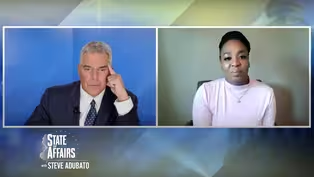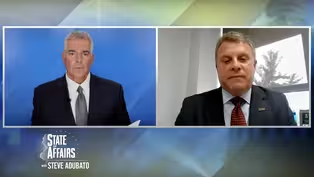State of Affairs with Steve Adubato
How Can NJ Improve in Affordable, Accessible Childcare?
Clip: Season 7 Episode 11 | 8m 10sVideo has Closed Captions
How Can NJ Improve in Affordable, Accessible Childcare?
Mary Coogan, President & CEO of Advocates for Children of New Jersey, sits down with Steve Adubato to discuss the ways New Jersey can improve in affordable, accessible childcare and early childhood development.
Problems playing video? | Closed Captioning Feedback
Problems playing video? | Closed Captioning Feedback
State of Affairs with Steve Adubato is a local public television program presented by NJ PBS
State of Affairs with Steve Adubato
How Can NJ Improve in Affordable, Accessible Childcare?
Clip: Season 7 Episode 11 | 8m 10sVideo has Closed Captions
Mary Coogan, President & CEO of Advocates for Children of New Jersey, sits down with Steve Adubato to discuss the ways New Jersey can improve in affordable, accessible childcare and early childhood development.
Problems playing video? | Closed Captioning Feedback
How to Watch State of Affairs with Steve Adubato
State of Affairs with Steve Adubato is available to stream on pbs.org and the free PBS App, available on iPhone, Apple TV, Android TV, Android smartphones, Amazon Fire TV, Amazon Fire Tablet, Roku, Samsung Smart TV, and Vizio.
Providing Support for PBS.org
Learn Moreabout PBS online sponsorship[INSPRATIONAL MUSIC STING] - We're now joined by Mary Coogan, President and CEO of Advocates for Children of New Jersey, our longtime colleagues involved in our Reimagine Childcare initiative.
Mary, how're you doing?
- I'm great.
How are you?
- I'm doing great.
Now, let's clarify that you are succeeding an iconic leader in Ceilia Zalkind, who was the leader there at Advocates for Children of New Jersey.
And people could check out so many interviews we did with Ceil.
Congratulations on the new job.
- Thank you.
Thank you.
It's tough shoes to fill.
- Yeah.
Tell everyone what Advocates for Children of New Jersey is.
- So we are a statewide child advocacy organization.
We're a multi-issue.
Our mission is to do what we can in terms of improving laws, programming and policies that will ensure that every child has the ability to grow up safe, healthy and educated.
- And along those lines, while we'll talk about childcare in a moment, the National KIDS COUNT program, the process of determining where our children are when it comes to economic wellbeing, education, health and family and community.
Where are we, in New Jersey, particularly compared to the rest of the country?
- So the Annie Casey Foundation, as you indicated, collects data from every state, and then, within four domains, ranks the states against each other.
So New Jersey has done very well, and we are number seven.
- What does that mean?
Number seven across the board?
- No.
So we are overall number seven, meaning there's only six states that are doing better in all four domains than us combined, but, individually...
So for example, in economic wellbeing, we came in at 29th, and I think that is because there are a significant number of children in New Jersey who are living with a high housing, a high-housing cost burden.
There's children who are living in households where parents do not have secure employment.
Which brings us to the childcare issue because many people have not been able to maintain their jobs because of a lack of childcare or not having steady childcare that they can afford.
In education, New Jersey is doing exceptional.
We were rated number two, but, from my perspective, we shouldn't be complacent because fourth graders are not proficient in reading and eighth graders are not proficient in math, which could be a result of virtual learning during COVID but something that really needs to be watched the data is-- - Mary, hold on.
When it comes to education, did the KIDS COUNT analysis take learning loss into account in connection with COVID?
- No, they just looked at the test scores.
- Okay.
Go ahead.
- So these were the first test scores that were done after the pandemic.
And that's what I'm saying.
I think they reflect the learning loss, again, probably across the nation.
But ranking number two, you don't wanna give the impression that everything is great because there are definitely issues.
I mean, we have staffing crisis in schools, there's many schools that don't have aids, many children did not get services that maybe their individual education plan required.
Kids are suffering in terms of anxiety, mental health issues, you name it.
You've read about it, and you've reported on it.
It exists in New Jersey.
It just means we're doing better than other states.
- Got it.
How about this?
Let's talk about, this is interesting, the state pocket guide.
In the state pocket guide, which is an important resource, school breakfast numbers are down.
What is this issue and why is it so important, Mary?
- So the pocket guide is actually, if I can just hold it up a minute, that's our publication.
This is ACNJ.
- I'm sorry, let's put up the website for ACNJ so people can find out more.
Go ahead, Mary.
- Okay.
So we took data.
We get funded by the Casey Foundation to gather data from state agencies and departments to provide a snapshot of how children are doing.
This year, we decided to just report the most recent data because we're just starting to see data and the impact of COVID.
So to your point with school breakfast, there was a huge campaign, ACNJ was one of the leaders, many organizations participated in.
And the idea was to make sure kids were getting breakfast after the bell, meaning in the classroom, so that they were not hungry, and they were ready to learn.
So you mentioned school lunch, certain household income levels determine eligibility for school lunch and school breakfast.
But to your point, I think it's 59% of the kids who are getting school lunch are also getting school breakfast, which means there's a huge number of children who are not getting breakfast in the classroom as was occurring prior to COVID.
And that's not a good place to be.
Now, it could be a data reporting issue, but we need to- - Let's shift gears for a second, Mary.
Let's talk about Reimagine Childcare, this initiative we've been involved in for several years creating greater public awareness around accessible, affordable, quality childcare.
Where do you believe we are to today and what progress needs to be made in the next year?
- So I wanna acknowledge the state investment.
I think, umm...
I heard the commissioner, you interviewed the commissioner the other day, and she talked about that.
And there's been a great investment.
But we are still seeing a childcare crisis in large part because of a staffing issue.
- That's right.
- So minimum wage has gone up gradually in New Jersey, and so childcare centers, small businesses, are paying minimum wage, and they are competing against other industries that can pay more.
And so where they might be paying 17, $18 an hour, which is higher than minimum wage, somebody could go to a retail establishment and make 20 something dollars an hour.
I think they have not been able to keep staff.
So people might be switching jobs or leaving jobs.
And so this does not provide the stability that families need to put their children into an environment where they know their child's gonna be well taken care of on a regular basis.
And it disrupts a parent's work situation.
- There are a whole range of childcare-related issues.
We'll continue to talk with Mary Coogan, the relatively new President and CEO of Advocates for Children of New Jersey.
Mary we look forward to those conversations because there's so much work to be done.
Thank you, Mary.
- Thank you.
- You got it.
I'm Steve Adubato, we'll be right back.
- [Narrator] State of Affairs with Steve Adubato Is a production of the Caucus Educational Corporation.
Funding has been provided by The Turrell Fund, supporting Reimagine Childcare.
The Russell Berrie Foundation.
New Jersey Sharing Network.
The New Jersey Economic Development Authority.
Hackensack Meridian Health.
Valley Bank.
Community FoodBank of New Jersey.
NJM Insurance Group.
And by PSC.
Promotional support provided by NJ.Com.
And by BestofNJ.com.
- I am alive today thanks to my kidney donor.
I am traveling and more active than ever before.
- I'm alive today thanks to my heart donor.
I'm full of energy and back singing in my church choir.
- I'm alive today thanks to my lung donor.
I'm breathing easy and I'm enjoying life'’s precious moments.
- They are about 4,000 people in New Jersey waiting for a life-saving transplant.
- Donation needs diversity!
- For more information or to become an organ and tissue donor, visit NJSharingNetwork.org.
The Challenges Facing Formerly Incarcerated Individuals
Video has Closed Captions
Clip: S7 Ep11 | 10m 37s | The Challenges Facing Formerly Incarcerated Individuals (10m 37s)
President of CIANJ Discusses Keeping Local Business in NJ
Video has Closed Captions
Clip: S7 Ep11 | 9m 29s | President of CIANJ Discusses Keeping Local Business in NJ (9m 29s)
Providing Support for PBS.org
Learn Moreabout PBS online sponsorship
- News and Public Affairs

Top journalists deliver compelling original analysis of the hour's headlines.

- News and Public Affairs

FRONTLINE is investigative journalism that questions, explains and changes our world.












Support for PBS provided by:
State of Affairs with Steve Adubato is a local public television program presented by NJ PBS

